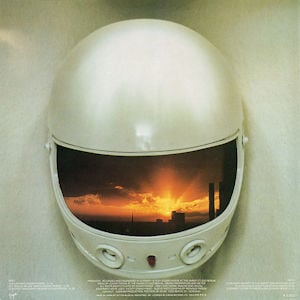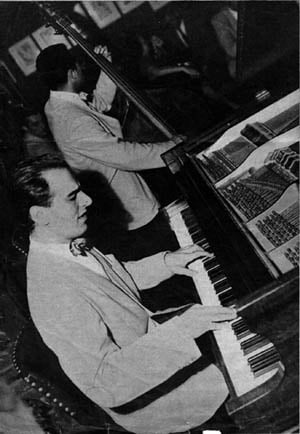/PAlogo_v2.gif)
/PAlogo_v2.gif) |
|
Post Reply 
|
Page <1 4567> |
| Author | ||||
verslibre 
Forum Senior Member 

Joined: July 01 2004 Location: CA Status: Offline Points: 15441 |
 Posted: May 08 2011 at 11:50 Posted: May 08 2011 at 11:50 |
|||
In the 1970s, Jan Hammer had no prob showing off on his synths, especially a Minimoog. (All of his solos were exquisite and tasteful so he's free and clear of the "w**k" hat.) Okay, I know what you mean, though (Tangerine Dream, Schulze, Neuronium, Synergy, Jarre, etc.). I do remember Vangelis laying down some nice stuff on Albedo 0.39, though.
|
||||
 |
||||
leonalvarado 
Forum Senior Member 

Joined: March 03 2009 Location: USA Status: Offline Points: 177 |
 Posted: May 08 2011 at 13:01 Posted: May 08 2011 at 13:01 |
|||
|
This is an interesting discussion. Music, like most art forms, is a very subjective thing. The first band that made a very big impression on me was The Beatles. Later on in life my taste turned much more towards progressive rock with some ambient, jazz and classical mixed in. I suppose I am one of the dinosaur-like fans that many people complain about in these forums. But then again, most of those people are young enough to be my kids. I can live with the dinosaur tag.
What attracted me to progressive rock was the virtuosity of some of the musicians. Keith Emerson, Rick Wakeman, Bill Bruford, Phil Collins, Steve Howe and Steve Hackett, Martin Barree, Barrie Barlow and Dave Gilmour to name a few. These musicians had some uniqueness about them as well as an amazing knowledge about their craft. They came out with the type of music that is emulated today by most, (including me). However, I recently tuned into one of those radio stations on iTunes that specifically plays progressive rock. For the first time I was exposed to a myriad of artists that I have never heard of. On first impressions I noticed something curious. A lot of them sound alike and there are too many guitar players that play much too heavy for the type of music. I guess some of that is what's known as prog-metal. Although there are some interesting ideas coming out of these new bands, I find them lacking uniqueness. No doubts about the musicians being good, however, some of the Van Halen-like guitar solos don't sound as if they belong with the rest of the compositions. For my taste, I wish they would tone-down the guitars a bit to let the mixing of all instruments flourish. It's just my opinion. Many people love this type of music and perhaps that's were the future of the genre will go. We live in strange times for the music industry. Money these days doesn't come from record sales but from touring. Touring itself is becoming harder for many bands because of competition. In the old days, new bands would do the bar-night club-circuit to build enough of an audience so that they could get closer to a record deal which in turn would lead to bigger tours, etc. In today scenario, many new bands have to compete with established artists and many times recording artists for the same spot on the circuit. Today's musicians are also very versed in playing the styles from their heroes. Equipment is more affordable and lessons can be taken in music schools that specialise in Rock, DVD teaching series and even the internet. The results are a crop of new musicians that by an early age, know all the tricks and tips developed by the "masters" form rock's past. When I was a kid, there weren't any music schools that even considered rock as "real" music. you learned the classical way or you didn't. There were no DVD's (even video tapes like Beta and VHS didn't get popular until the mid-seventies). The accessibility and availability of the material just wasn't there. What lacks in many of today's bands is originality. They sound good and perform good but, they do seem sometimes as if they are more focused in trying to impress than in creating the best possible song they could create. What I liked about my favourite bands was the fact that they were all good as well as very individualistic. Yes does nto sound anything like Genesis and King Crimson does not sound anything like ELP but they were all good in their own way. Like Bill Bruford once said to me, try not to sound like the other guy. I realise that such a statement is easier said that done (even with my own music). But the idea is to at least keep trying to find a unique sound. I do wish at times that some of these bands would concentrate more in the music than in impressing their audience. This would require to sometimes play less notes. I can't judge myself as to my own musical approaches but, you can check some samples of my latest CD here and judge for yourselves. |
||||
 |
||||
kalabian 
Forum Newbie 

Joined: February 25 2011 Status: Offline Points: 10 |
 Posted: May 16 2011 at 01:45 Posted: May 16 2011 at 01:45 |
|||
|
Musicality.
IMO it's harder to write a Musically focused song than a very technical one. |
||||
|
http://samuelfianza.tumblr.com
http://soundcloud.com/sammol http://inhumanphi.bandcamp.com http://ferusph.bandcamp.com |
||||
 |
||||
giselle 
Forum Senior Member 
Joined: March 18 2011 Location: Hertford Status: Offline Points: 466 |
 Posted: May 16 2011 at 03:40 Posted: May 16 2011 at 03:40 |
|||
|
Interesting post by Leonalvarado.
|
||||
 |
||||
Ludjak 
Forum Groupie 

Joined: August 31 2008 Location: Croatia Status: Offline Points: 73 |
 Posted: May 16 2011 at 07:41 Posted: May 16 2011 at 07:41 |
|||
|
For me, 'technicality' isn't measured by the number of notes you can play per minute, but rather by being able to artistically express yourself on your instrument (thus becoming a very subjective matter, at least when it comes to producing original music). Therefore, I find 'musicality' subordinated to 'technicality', which prevents me from answering the thread question.
|
||||
 |
||||
The Pessimist 
Prog Reviewer 

Joined: June 13 2007 Location: United Kingdom Status: Offline Points: 3834 |
 Posted: May 16 2011 at 17:03 Posted: May 16 2011 at 17:03 |
|||
|
Surely technicality is a factor that exists within musicality? Depends what you mean by technical. It's very hard to be musical without some solid grounding in your technique, especially in jazz and classical (which is what most prog takes its influence from) I imagine. Also it's very hard to compose something interesting without having something technically challenging in it, whether it be a high note on a cello or a fast passage in a keyboard part, or even a quiet drum part ;)
|
||||
|
"Market value is irrelevant to intrinsic value."
Arnold Schoenberg |
||||
 |
||||
nasubzna 
Forum Newbie 
Joined: May 17 2011 Location: florida Status: Offline Points: 1 |
 Posted: May 17 2011 at 22:52 Posted: May 17 2011 at 22:52 |
|||
|
I listen to music to be impressed. I go to concerts to see improvised
solos, jazz impresses me. And technicality does as well. It's very fun
to listen to and if mixed with Musicality well you get acts like Animals
as Leaders or Dream Theater. I feel like "Technicality" is what
separates "Progressive Rock" from "AOR", Dream Theater from Creed or
Metallica
OneNote 2010 My Birkenstock sandals |
||||
 |
||||
Alitare 
Forum Senior Member 
Joined: March 08 2008 Location: New York Status: Offline Points: 3595 |
 Posted: May 17 2011 at 22:54 Posted: May 17 2011 at 22:54 |
|||
...And Justice For All wasn't technical?
|
||||
 |
||||
Icarium 
Forum Senior Member 

VIP Member Joined: March 21 2008 Location: Tigerstaden Status: Offline Points: 34055 |
 Posted: May 18 2011 at 02:21 Posted: May 18 2011 at 02:21 |
|||
|
musicality
technicality
both good versions
also this is Jon Anderson singing sencible lyrics, and he do it very well... Edited by aginor - May 18 2011 at 02:23 |
||||
 
|
||||
 |
||||
giselle 
Forum Senior Member 
Joined: March 18 2011 Location: Hertford Status: Offline Points: 466 |
 Posted: May 19 2011 at 00:59 Posted: May 19 2011 at 00:59 |
|||
|
||||
 |
||||
uduwudu 
Forum Senior Member 
Joined: July 17 2007 Status: Offline Points: 2601 |
 Posted: May 19 2011 at 03:50 Posted: May 19 2011 at 03:50 |
|||
|
From what I infer from these posts Musicality is about someone interpreting how involved they've become with a piece.
Technicality is just that, pure technique. What you have not how you use it. Everyone practices scales but then you pause on a note and... maybe something happens. As for Imagine; that is all about his lyrics and based around his idea of "Imagine there's no...". If someone says something sucks I wish they'd say why. Back it up! Now most posts here are not so bad. Fair bit of technique, quality punctuation and spelling and I appreciate some Spanish in the posts. This way there's some character in the writing not just grammatically sound English. Hope I've not gone off topic here... P.S. A chord sequence involving F major to G Major to A major will have something going for it. Try it. (It will probably sound awful, I know of a punk tune that went like that. Set my teeth on edge.) The logical chord is an A minor. A similar example I vaguely recall is Sgt Pepper where the chord sequence first goes from F to Ab. Major, not the logical minor. It gives it that overly bright brass band feel McC was looking for. There isn't a minor chord in the whole thing. It's not even strictly cadential. As far as I recall... probably in some bits. Not easy though and Jimi had to learn it by ear in 3 days. He should have given a Day In The Life a spin. That melody is way more useful and fun on guitar - just ask Jeff Beck. BTW the reason so many songs use V-IV-I is so the singer (they are usually singer's chords) cannot (really should not) go out of tune, so long as they are using the scale(s) determined by the chords. Of course you can get deceptive things like Season Of The Witch which seems like it's two chords (it is) but the last chord impiles the dominant V and it turns around on itself easily. Two chords eh, make that interesting. Now there's a challenge... Stairway uses a lot of V-IV-I in it's verses but no one moans about that. (Yes I know there's more to it that just that!... Heh. Back to listening to Masfel's Viperflat. This is so cool... oh, and technical! |
||||
 |
||||
rogerthat 
Prog Reviewer 
Joined: September 03 2006 Location: . Status: Offline Points: 9869 |
 Posted: May 19 2011 at 09:25 Posted: May 19 2011 at 09:25 |
|||
I would say writing music is the most important skill for any musician to have and therefore great songwriters would have to be great musicians almost by default. Also, though there have been unschooled songwriting wizards, they generally knew their theory and knew what they were doing. So, perhaps, by musician, you mean simply the performer here. I think especially in rock, being good at writing music is crucial and I would totally consider Donald Fagen a better musician than Yngwie Malmsteen. |
||||
 |
||||
Alitare 
Forum Senior Member 
Joined: March 08 2008 Location: New York Status: Offline Points: 3595 |
 Posted: May 19 2011 at 09:44 Posted: May 19 2011 at 09:44 |
|||
Three cheers for that. I'm no Steely Fan, but all Yngwie did was w**k off hour after hour (but even I'll admit it was entertaining the first time around.)
|
||||
 |
||||
Vibrationbaby 
Forum Senior Member 
Joined: February 13 2004 Status: Offline Points: 6898 |
 Posted: May 19 2011 at 09:55 Posted: May 19 2011 at 09:55 |
|||
|
I agree with Bruford's comment on Leonalvarado's post, " try not to sound like the other guy." There's a music store not far from my office and whenever I go in there there.s always kids copying note for note the latest metal guitar solo. I think you can be technical, musical and original at the same time. Although I love Emily Remler's guitar playing she just sounded too much like Wes Montgomery at times. One guy who managed to sound original while being technical and musical at the same time was Canadian guitarist Jeff Healey. He was influenced by a myriad of musicians and played a great combination of originals and original covers.
Edited by Vibrationbaby - May 19 2011 at 09:57 |
||||
 |
||||
giselle 
Forum Senior Member 
Joined: March 18 2011 Location: Hertford Status: Offline Points: 466 |
 Posted: May 19 2011 at 13:33 Posted: May 19 2011 at 13:33 |
|||
|
||||
 |
||||
uduwudu 
Forum Senior Member 
Joined: July 17 2007 Status: Offline Points: 2601 |
 Posted: May 19 2011 at 16:11 Posted: May 19 2011 at 16:11 |
|||
|
A very good example of musicality / technique and the appropriate success ratio is that of the 80s technoo freks Yngwie and many others. Many albums (all LPs and pre CD) got released and filled the sale bins around the world. Yet they were all guitar whizzes.
Alot of the criticism from the letters to press went along the lines of too loud,too fats etc. Critic Chris Welch thought no one had levelled these osrt of criticisms at guitarists like Beck, Howe, Hendrix etc. Je though Jason Becker, Yngwie et all were great. Yet the albums did not sell. Why not? Plenty of rock fans loved exciting, interesting playing - even if only they thought so and no one else did. (Like here on PA at times...;) The factor I identified in these examples was individuality, uniqueness and having something to say. They had different ways of saying it. As opposed to the same way that the "trained" axe meisters have. Alot of people dug the 80s guitar slingers but only the best (e.g. Satch) live on now. I've only the one Satch album at the moment (Professor Satchifunkilinkus) but the key factor is a thing called melody. The pieces are instrumentals but they are very good tunes and at least 1 being great. Naturally his technique is the very best. A good way of hearing the imporatnt difference is getting hold of a boot (nothing official yet) of Satch with Deep Peuple. A great technician playing great songs. His sucessor Steve Morse is an amazing guitarist with the Dixie Dregs with great music. Morse has also been creatively and commercially successful with Deep Purple. Not bad for some one who had to undergo 3 auditions to be a back up player for De Lucia, McLaughlin and Di Meola. The difference between technique and musicality is like going to a music clinic (any will do - they are very academic) and listening to someone play a composition. One is a demonstration the other is performance. Getting the two confused created a problem. It's a little like music fans not being able to distinguish between objectivity (too dry, academic, intellectual) and subjectivity (I love it therefore it is great). The thing is people can distinguish but not necessarily identify cogently these factors. Thus the 80s guitar hot shots fired damp squibs with not a memorable tune between them and the 60s / 70s innovators are still pulling in crowds. And having their albums pirated en masse. Or do I mean sold? |
||||
 |
||||
rogerthat 
Prog Reviewer 
Joined: September 03 2006 Location: . Status: Offline Points: 9869 |
 Posted: May 19 2011 at 19:56 Posted: May 19 2011 at 19:56 |
|||
Disagree with this. Possibly, good composers know the full vertical well and especially also what they can get out of singers and musicians. So, they would have to know about music. Many of these composers made their way into the industry by first playing gigs at a small level to sustain themselves. It could get very difficult, practically, to operate as a composer and get the performers to play your songs if you don't know about music. People have done that too, but many composers are generally equipped and 'educated'.
I don't think that is per se a problem. As I said earlier, I'd expect a musician per se to able to write songs and they would have done well anyway. What distorted the direction of rock critique and the things that get appreciated more in rock was probably Woodstock. It has over the years caused critics and audiences to place far too much importance on the live act of the band, and then on the spectacle of it rather the substance. When Beatles set rock free from the clutches of the labels, they did it with top class songwriting, not virtuoso playing. But that legacy got drowned somewhere and people who could play very well but did not necessarily have such a great compositional vision were encouraged more and more. Why were ELP the most popular prog rock band of the 70s and not Genesis (not in the Gabriel years, that is)? Because they had the most popular live act. Critics did not seem to realize that the more important thing is to produce quality albums and not to load bands with terrific performers (who weren't necessarily always the best at writing songs).
I don't know, I call anything with vocal melody in a cyclical verse/chorus as songs and Steely Dan wrote some of the best of those in the 70s, behind only a few like Stevie Wonder and ahead of more illustrious forces in rock like Led Zeppelin who mainly put together rambling rifferama that, for me, goes nowhere at the end of the day. LZ is again a good example of the above para I wrote. More live flamboyance than songwriting brilliance (not to say they had none of the latter). And most of SD's songs are not half formed or mere riff excursions at all (which would become a pattern in the 80s) and they are generally tightly linked to lyrical themes. Their post modern decadence is not for everyone, but well, that is their choice and nothing that takes away from the merit of their work. Oh, and by the way, Donald Fagen's solo album from 1981 The Nightfly has excellent songs, with very different moods from SD, though essentially in the style used on Gaucho. In any case, this defence of SD is beside the point which was simply that Fagen is great at writing music while Malmsteen is only great at playing it on guitar. |
||||
 |
||||
rogerthat 
Prog Reviewer 
Joined: September 03 2006 Location: . Status: Offline Points: 9869 |
 Posted: May 19 2011 at 19:59 Posted: May 19 2011 at 19:59 |
|||
I think this is probably what the OP addressed. I wish Hughes still posted on this forum, would have been fun!  |
||||
 |
||||
uduwudu 
Forum Senior Member 
Joined: July 17 2007 Status: Offline Points: 2601 |
 Posted: May 19 2011 at 21:30 Posted: May 19 2011 at 21:30 |
|||
|
I recall this quote (not verbatim... by Elton John. He (apparently) felt sorry for guitar players who get too concerned with a great riff (and presumably nothing more than that). Unlike pianists one supposes. Anyway the more oriented toward an instrument a muso is the more he writes for that instrument. e.g. Mark King (Level 42), Stanley Clarke ( lthought the suspect standard of alot od earlier solo out put makes me think he gets confused... Herman Rarebell, Cozy Powell (oh good, drummers writing melodies on their kits...) ;),
A good example of a muso who was pretty good at what he did but always happy to let a "specialist" do the necessary is (IMHO) the somewhat overlooked and underrated George Harrison. I know, I kknow... underrated Beatle? Yer what?! But yes. A song writer (who could sing) who could do some nice guitar work and made more outstanding tunes in later Beatle years than those others whatever their names were. viz All Things Must Pass. One example I have of technique vs musicality (I interpet this as songman ship) is a Jeff Beck gig I amnaged to get o. Along with Tony Hymas and Terry Bozzio they proceeed to play Guitar Shop material. Shame I don't like it. But that I put down to no bass player. Anyway it struck me and my date that it was not exactly the most generous of music. Lots of amazing stuff for an analyst to appreciate but not a listener to like... (that was the only time I did wonder about Beck's approach.) On the other hand he had White Stripes along. Jack White led on some Yardbird numbers and did great with Beck and his excellent band accompanying. Big fail is White's drummer. No song smith, no drummer either this (IMHO) was dreadul and clearly a gimmick. No technique nor songs. Jeeznis, I might as well be listening to techno... (which could be really good if someone paid attention to detail... Rant over (for the moment... )  |
||||
 |
||||
giselle 
Forum Senior Member 
Joined: March 18 2011 Location: Hertford Status: Offline Points: 466 |
 Posted: May 20 2011 at 10:08 Posted: May 20 2011 at 10:08 |
|||
Good comparison. And you don’t need to defend SD to me in terms of what they do as a whole, I like it a lot. I just think that with better songs it could reach another level.
|
||||
 |
||||
Post Reply 
|
Page <1 4567> |
| Forum Jump | Forum Permissions  You cannot post new topics in this forum You cannot reply to topics in this forum You cannot delete your posts in this forum You cannot edit your posts in this forum You cannot create polls in this forum You cannot vote in polls in this forum |